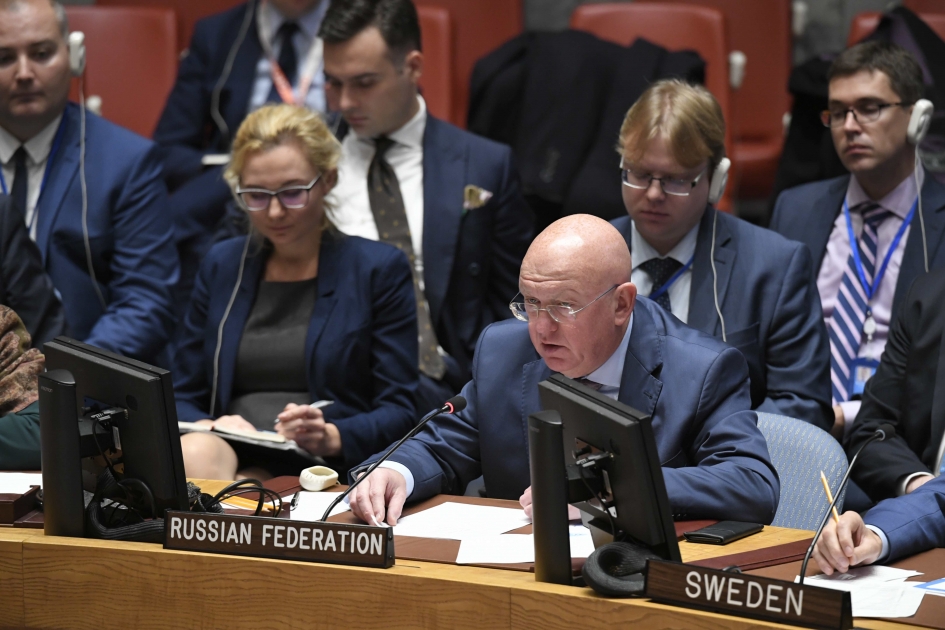Statement by Ambassador Vassily A. Nebenzia, Permanent Representative of the Russian Federation to the United Nations, at the Security Council meeting on the Central African Republic
We thank Mr. Parfait Onanga-Anyanga, Special Representative of the Secretary-General, Mr. Bédializoun Moussa Nébié, Special Representative of the African Union to the Central African Republic, Mr. Koen Vervaeke, Managing Director for Africa of the European External Action Service, and Ambassador Léon Adom of Côte d’Ivoire for their briefings.
We share the concern expressed in the SecretaryGeneral’s report on the Central African Republic (S/2018/922) about the continuing unstable situation in the country, especially on the security front. A significant part of its territory is still controlled by armed groups. Despite some positive improvements regarding the issue of expanding State authority, the local Government bodies cannot fully carry out their functions.
We would like to express our sincere condolences for the peacekeepers who lost their lives this year. The courage of the Blue Helmets in the Central African Republic cannot be overestimated. We want to express our support for the efforts of the United Nations Multidimensional Integrated Stabilization Mission in the Central African Republic (MINUSCA) and of Mr. Onanga-Anyanga personally.
We realize that the Mission’s task is not an easy one, considering the size of the country and the presence there of a large number of armed groups. Russia, as a permanent member of the Security Council and a member of the International Support Group for the Central African Republic, intends to continue its full support to the process of national reconciliation that has begun there, acting in coordination with the authorities in Bangui, the African Union, the leadership of the Republic of the Sudan and the other stakeholders involved in the quest for ways to normalize the situation in the Central African Republic.
We agree with the Secretary-General that the African Initiative for Peace and Reconciliation in the Central African Republic is vital as a pathway to a political settlement. We support the comprehensive implementation of the road map for a Central African settlement adopted in Libreville on 17 July 2017 through the mediation of the African Union. The progress made in implementing the African Initiative is a positive step, and we particularly welcome the talks held in the city of Bouar from 28 to 30 August by the Initiative’s panel of facilitators with the representatives of 14 armed groups. We hope that the consolidated document that resulted will lead to an early start to a direct dialogue between the Government and the armed groups.
We believe that the talks held on 28 August in Khartoum under the auspices of President Bashir of the Sudan between the leaders of the largest armed groups, including some formerly allied with the Séléka and anti-balaka, represent an important step within the framework of the general African effort to find ways to help the Central African Republic emerge from conflict.
The declaration signed at the conclusion of the meeting in Khartoum announced the creation of a united Central African opposition with the aim of achieving a lasting and sustainable peace in the Central African Republic, recording their commitment to the African Union Initiative, their willingness to start a peace process with the central Government and their obligation to respect human rights and ensure the free and safe movement of representatives of humanitarian and other non-governmental organizations throughout the country. We presume that such an association will enable them to reach concrete agreements with the Government of the Central African Republic.
As we have repeatedly emphasized, Russia supports harmonizing the various Central African Republic peace initiatives to help advance the negotiation process, which will help to prevent them from competing with one another, as the SecretaryGeneral’s report cautions against. Russia’s assistance in organizing the contacts in Khartoum is in line with the efforts of the African community, which is making a decisive contribution to ending the stalemate in crisis situations on the African continent in accordance with the African Union’s principle of African solutions to African problems.
We consistently advocate for the backing of the international community and especially the Security Council for agreements that are being developed through the mediation of the African Union and other African bodies, and for providing them with political, moral and material support. We note the steps that Bangui has taken in reforming the security sector with a view to regaining control over the entire country. Together with the support of the international community, they are designed to help normalize the situation in the Central African Republic and to implement the national defence plan approved by President Touadera with the aim of gradually transferring responsibility for the country’s affairs to its lawful authorities.
For our part, we affirm that Russia will continue to support the Central African Republic’s authorities in reforming the national security sector, including in the area of strengthening the armed forces’ combat capability and staff potential. Russian military specialists managed to achieve significant results in a short space of time in training more than 1,000 Central African troops. We also intend to continue to increase our assistance on the humanitarian front, particularly through the provision of medical services to the population.
Our collaboration with the Central African Republic’s legitimate authorities in rebuilding its national security forces is constructive and transparent, as testified to by the latest report of the Panel of Experts of the Committee established pursuant to resolution 2127 (2013) concerning the Central African Republic and by the results of recent thorough inspections by United Nations representatives of a first batch of military equipment donated by Russia to the Central African Republic’s Ministry of Defence at the beginning of this year.
Besides that, we hope that our military and technical assistance to Bangui will cease to provoke what might be termed jealousy among our Council colleagues. We believe that in the current circumstances on the ground in the Central African Republic, constructive collaboration on the part of all international stakeholders is urgently needed.
